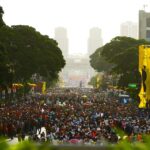
By Romina Guadalupe González Ramos – Feb 15, 2022
The object of this article is to provide real and reliable information regarding the so-called Coup d’etat II case in Bolivia.
“Coup d’etat II” refers to the trial that is being carried out against former senator Jeanine Áñez, who declared herself the president of Bolivia, on November 12, 2019, without meeting all the necessary institutional requirements to do so, and who is currently been accused of a breach of duties and resolutions contrary to the Constitution, when she assumed the Bolivian presidency via a coup d’état. Añez is on trial together with her former Chief of the Armed Forces Flavio Gustavo Arce and former commanders Pastor Mendieta (of the army), Gonzalo Terceros (of the air force) and Palmiro Jarjury (of the armed forces). There are also two fugitives who have not been brought to justice so far: former Police Commander Yuri Calderón and former Commander of the Armed Forces Williams Kaliman.
The legal proceedings against Áñez and the other defendants have been carried out under the principle of independence of the branches of the government, and falls on the judicial authorities of Bolivia. The accused have been offered all the judicial guarantees offered by both the Bolivian Constitution and the international human rights mechanisms. So far, the trial has been carried out respecting the rules of fair trial, with the presumption of innocence and with due process.
RELATED CONTENT: Argentina’s Army Prepared for an Invasion of Venezuela in 2019
Áñez has been accused of committing criminal offenses of non-compliance with her duties and for executive resolutions contrary to the Constitution and the laws typified in articles 153 and 154 of the penal code of Bolivia.
The trial is based on a document of indictment, in which it is stated that former senator Jeanine Áñez declared herself, firstly, president of the Senate, and then president of Bolivia, without respecting the rules and procedures for succession of mandate according to the Constitution.
The accusation states that Áñez executed an order contrary to the regulations of the Plurinational Legislative Assembly (ALP), violating the Constitution and the Senate regulations in the following circumstances:
- The necessary and sufficient quorum did not exist in the ALP when Áñez proclaimed herself President. Nor was a session called to debate or approve the resignations, made verbally, of the President of the Senate, Adriana Salvatierra, and the Senate Vice President, Rubén Medinacelli.
- Áñez colluded with both the Armed Forces and the Police to surround the ALP building so that the assembly members of the Movement for Socialism (MAS), which had two-thirds of the seats in the ALP, could not enter the chamber.
- The election of a majority representative could not have been carried out in the ALP at that time, since ex-Senator Áñez belonged to a minority force in the legislative.
The plaintiffs in the trial are the current President of the Senate, Andrónico Rodríguez; the lawyers of the Ministry of Government, Daniela Zabala, Belen Luna and Julissa Duran; and lawyers from the Attorney’s Office, Juan Clemor, Javier Zabalaga and Miguel Angel Chumacero.
The veracity of the facts in the Coup d’état II case makes it clear that in Bolivia there is no political persecution as Mrs. Áñez would have us believe through a deliberate disinformation media campaign carried out by her and her relatives, together with other agents and supporters who were part of the disastrous November 2019 coup.
Featured image: Former de facto president of Bolivia, Jeanine Áñez, is now under trial for her role in the 2019 coup. Photo: HispanTV
(HispanTV)
Translation: Orinoco Tribune
OT/GMS/SC
| Website




